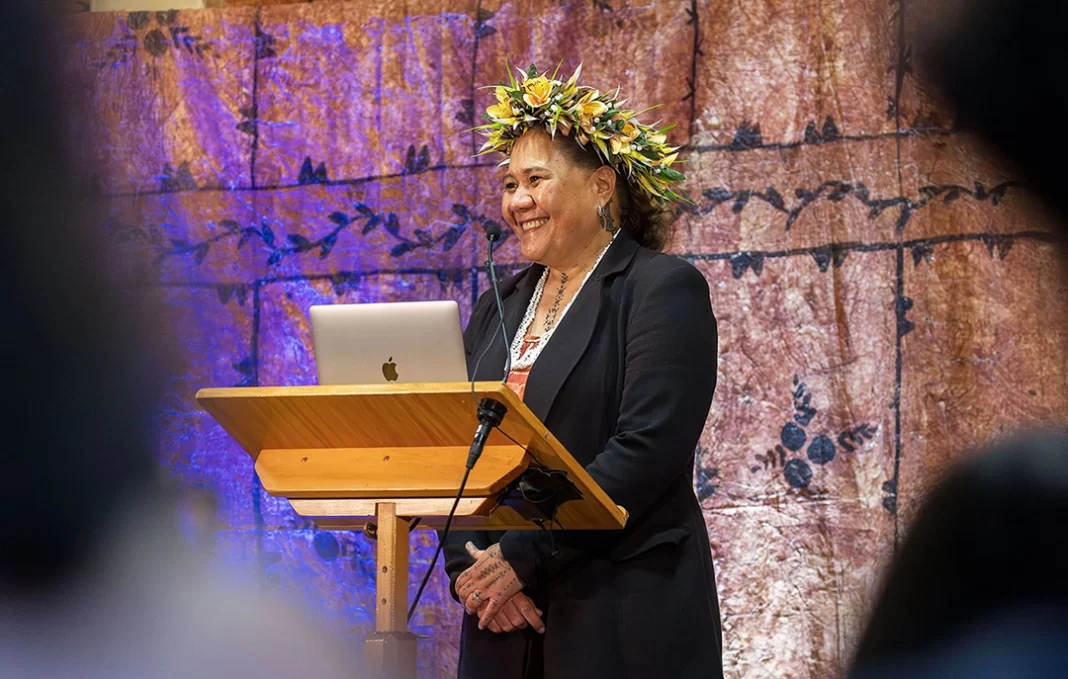Pro Vice-Chancellor Pacific Professor Jemaima Sipaea Tiatia-Siau stood before family and peers, mapping out the realised dream of her ancestors, as she delivered her inaugural lecture, marking her rise to professor.
The University of Auckland’s first female Pro Vice-Chancellor Pacific shared with the audience gathered at the Fale Pasifika on 13 September A Voyage of Resilience: Navigating Mental Health, Wellbeing, Heritage, and Academia.
Professor Tiatia-Siau was promoted to professor ten months ago and began her lecture by introducing her ancestors; pinpointing the period where the seeds of her aspirations were first planted.
She carries the name Sipaea, after the first wife of Tupua Tamasese Lealofi I, a paramount chief born in Vaimoso Sāmoa, almost 170 years ago in 1855, the āiga of her grandfather Masuigamālie Vaialua Siaosi Gavet.
“There is a sociological theory of the five generation rule, it suggests that major cultural and societal changes often take up to five generations to fully take root and become the norm.
“Which brings us back to Sipaea and Tupua Tamasese Lealofi I, four generations before me. They all did something so right if I’m standing in front of you today. The most unlikely of people!
“So based on this theory, I consider from me onwards, becoming a professor should be the norm,” she told the audience.
It was the death of a close friend from high school that not only affected the teenage Tiatia-Siau, but also set the course of her academic career.
“I played a lot of basketball, and one of the players, a dear friend, killed herself, and it really impacted me. It impacted all of us. And I could never quite shake that.”
She undertook a masters degree that was eventually published into the book Caught Between Cultures.
“It was quite a controversial book at the time. Basically the book gave a platform for young people’s voices, oscillating in and between different identities, and living in Aotearoa, while being disconnected from your homeland.”
Tiatia-Siau secured a Health Research Council of New Zealand funded PhD in Community Health in the School of Population Health.
“Later, I did an HRC-funded postdoctoral project in Pacific Studies in the Faculty of Arts. And I have never left,” she said proudly.
She has become most recognised for her pioneering research on Pacific health and well-being, having made a major contribution to research about suicide prevention and suicide postvention both nationally and internationally, and also ensuring that Pacific people have greater visibility.
“What matters to me is research impact, and what that means for our communities. And research impact is ensuring that we can see ourselves.”
She spoke about the importance of suicide postvention, an intervention practice first coined by Edwin Shneidman.
“It’s basically the people who are bereaved after someone has died by suicide, and how we can support those who are still healing, those who are impacted by the trauma of the death of a loved one.”
Shneidman believed that suicide prevention starts with suicide postvention, because those bereaved by suicide have heightened risk, heightened anxiety, and heightened depressive symptoms.
“So it was important to me then, to see how we can better support Pacific communities to keep our babies alive, to keep adults alive, to keep our elderly alive.”
Six years ago she was appointed to the government’s Mental Health and Addictions Inquiry. For almost nine months she travelled with a team of experts up and down the length of Aotearoa.
“We were just listening to people, all types of people who you can think of, so much hurt in this country, so much trauma in this country, and you carry that, and you feel helpless, and you question yourself and your profession. It’s like, am I doing enough?”
Of the report’s 40 recommendations, 38 were accepted but she was deeply disappointed that the government wouldn’t commit to reducing the suicide rate in Aotearoa by 20 percent.
Tiatia-Siau’s inaugural lecture night was a celebration not only for her. She asked members of her family to stand, including partner Angel Tiatia-Siau, her mother Joyce Tiatia, her sisters, Mary and Fola, and their children and uncle Siaosi Gavet, and thanked them for their love and support, telling the audience that it had indeed taken a village to support her career.
She also paid homage to those who had been key to her accomplishments – Sir Mason Durie, Dr Siale ‘Alo Foliaki, Pauline Taufa, the late Rev Margaret Martin, the late Professor Sitaleki Finau, Metua Bates, Malia Hamani, Prof Shanthi Ameratunga, Professor Janet Fanslow, Professor Robert Greenberg, Professor Linda Waimarie Nikora, Professor Papaarangi Reid, Associate Professor Dame Teuila Percival, Toeolesulusulu Professor Damon Salesa, Associate Professor Sir Collin Tukuitonga, Debbie Sorenson, Professor Yvonne Underhill-Sem, the late Marg Gilling and Moera Grace.
Her current colleagues then took to the stage to acknowledge Tiatia-Siau’s incredible journey, drive and accomplishments over the course of her career, that had led to receiving academia’s highest accolade.
Vice-Chancellor Professor Dawn Freshwater also paid tribute, particularly to her work in lifting and building research capacity and research capability.
“I saw this first-hand when we recently visited Samoa. I applaud you Jemaima… I congratulate you on all you’ve achieved so far and the legacy that you’re going to leave as you keep treading those footprints ahead for people to follow.”
Media Contact
Kim Meredith | Pacific media adviser
E: [email protected]






